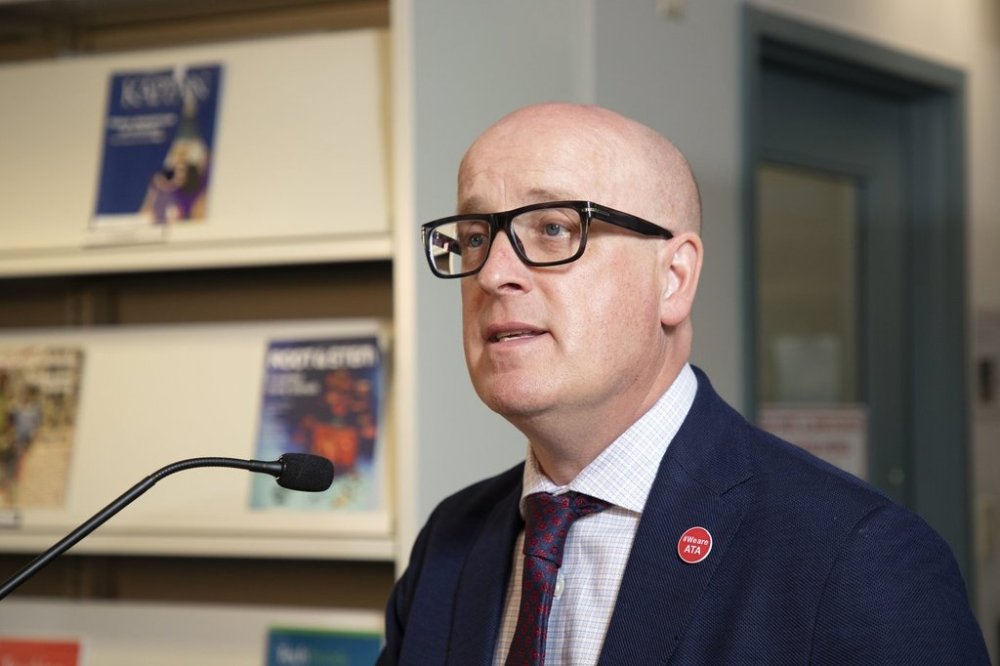Alberta teachers union welcomes classroom complexity proposals, demands funding
Advertisement
Read this article for free:
or
Already have an account? Log in here »
To continue reading, please subscribe:
Monthly Digital Subscription
$0 for the first 4 weeks*
- Enjoy unlimited reading on winnipegfreepress.com
- Read the E-Edition, our digital replica newspaper
- Access News Break, our award-winning app
- Play interactive puzzles
*No charge for 4 weeks then price increases to the regular rate of $19.00 plus GST every four weeks. Offer available to new and qualified returning subscribers only. Cancel any time.
Monthly Digital Subscription
$4.75/week*
- Enjoy unlimited reading on winnipegfreepress.com
- Read the E-Edition, our digital replica newspaper
- Access News Break, our award-winning app
- Play interactive puzzles
*Billed as $19 plus GST every four weeks. Cancel any time.
To continue reading, please subscribe:
Add Free Press access to your Brandon Sun subscription for only an additional
$1 for the first 4 weeks*
*Your next subscription payment will increase by $1.00 and you will be charged $16.99 plus GST for four weeks. After four weeks, your payment will increase to $23.99 plus GST every four weeks.
Read unlimited articles for free today:
or
Already have an account? Log in here »
EDMONTON – The head of the Alberta Teachers’ Association says a report on classroom aggression and complexity largely vindicates its longstanding calls for more support and money to fix the problem.
Jason Schilling says despite Premier Danielle Smith’s commitment to “show the teachers that we heard them,” her government needs to fund and follow through with key recommendations from the report.
“I am fairly cynical, I am fairly untrusting of what I hear from politicians,” Schilling told reporters Friday.

“I need to see the actions, I need to see the funding, and I need to see the changes in our classrooms.
“We are done with recycled press conference talking points.”
The report was compiled by a team of 25 education stakeholders, including school board representatives, teachers and superintendents.
It describes schools “operating in crisis mode” with frequent behavioural incidents and teachers and staff facing “emotional exhaustion, safety risks, and unsustainable workloads.”
It calls for more hiring to reduce student-to-teacher ratios, and expanding access to specialized grants for young children with severe disabilities.
Smith, announcing the release of the report Friday in Calgary, said her government needs to collect class size data first, identify the classrooms that need help the most, and develop a new policy around special needs education.
“We’re going to address these issues,” she said. Smith didn’t commit to specifics, but said she expected “significant changes” to roll out in the New Year.
Education Minister Demetrios Nicolaides expressed an eagerness to collaborate with teachers and act on the recommendations as quickly as possible.
“Teachers have to wear multiple hats today,” he said.
“They have to be teachers, translators, interpreters, clinical professionals, therapeutic experts. That’s just not realistic. That’s just not a feasible environment.”
Smith said her government is focusing resources on the classrooms that have the biggest needs while supporting “the success of every single student.”
The release of the report comes after Smith’s government passed a law last month, invoking the Charter’s notwithstanding clause to end a three-week long strike and force 51,000 teachers back to work. The legislation imposed a collective bargaining agreement previously rejected by a vast majority of teachers.
The teachers’ association is fighting the bill in court.
Fixing classroom size and complexity were key reasons driving the decision to walk off the job in the first place. While Schilling welcomed many of the report’s recommendations, he said if the government had been listening before, they could have achieved a negotiated settlement.
“If (this) was rhetoric that we were hearing at the bargaining table, we wouldn’t have been on strike,” he said.
Schilling said provincial underfunding over a decade is what led to deteriorating conditions in classrooms.
Smith, however, insisted pressures on the education system have been brought on by the province’s booming population in the last three years, but agreed something must be done.
“I don’t know that you’ve ever had a case where kids are punching, or biting teachers to the point where it causes so much damage they need surgery. I don’t know that we’ve had those situations before,” she said.
Schilling also questioned the necessity of another teacher advisory council being proposed by Nicolaides given the teachers’ association represents rank-and-file instructors and is willing to give feedback to the government directly and immediately.
Alberta Opposition NDP education critic Amanda Chapman said the government has shown a lot of willingness to create committees, but said that won’t address the biggest classroom challenges.
Chapman said if the government was serious, they could show it by committing more money and more resources.
“I didn’t hear that from the government today,” Chapman said.
This report by The Canadian Press was first published Nov. 21, 2025.

